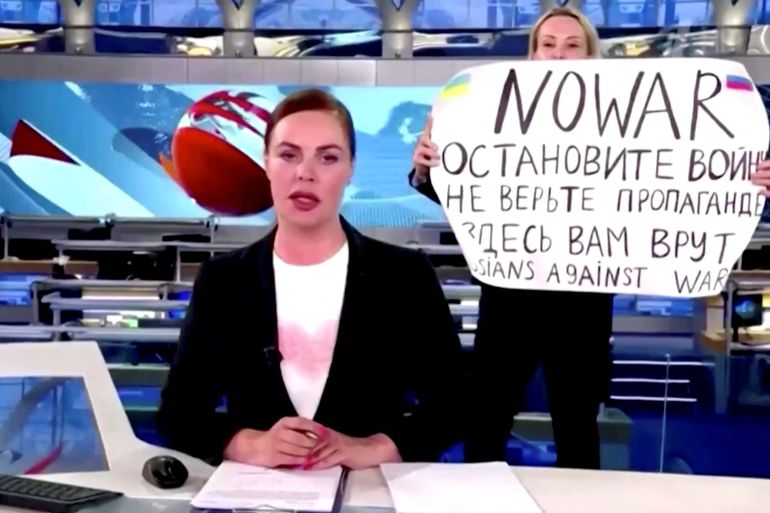Fears mount over ‘missing’ Russian anti-war TV protester
UN calls on Russia to ensure Marina Ovsyannikova will not face reprisals for her protest on live television.

The United Nations and human rights organisations have warned Russia against punishing a Russian journalist who appeared on state TV brandishing an anti-war sign.
In an act of dissent on Monday, Marina Ovsyannikova held up a poster behind the studio presenter of Russia’s state TV Channel One and interrupted a live news bulletin by shouting slogans denouncing Moscow’s war in Ukraine.
Keep reading
list of 3 itemsFirst convoy of civilians escapes besieged Mariupol
US warns China against coming to Russia’s aid in Ukraine
The phrases “NO WAR. Stop the war. Don’t believe propaganda. They are lying to you” were written on the sign.
Shortly after, she was arrested and taken to a Moscow police station. Her current whereabouts are unknown.
The Kremlin on Tuesday described Ovsyannikova’s actions as “hooliganism”.
“As far as this woman is concerned, this is hooliganism,” Kremlin spokesperson Dmitry Peskov told reporters, praising Channel One for what he called its quality, objective and timely programming.
UN human rights spokesperson Ravina Shamdasani called on Russian authorities to ensure that Ovsyannikova “does not face any reprisals for exercising her right to freedom of expression”, as fears grew for her safety.
Pavel Chikov, head of Agora human rights group, said Ovsyannikova “has not yet been found”.
“She has been imprisoned for more than 12 hours,” he wrote on Twitter.
Amnesty International said Ovsyannikova’s act was “courageous” and called for her release.
“The Russian authorities must immediately release Marina Ovsyannikova, who has been held by them after her courageous protest staged on live TV,” said Marie Struthers, Amnesty International’s Director for Eastern Europe and Central Asia, in a statement.
“No one should be detained solely for expressing their opinions, let alone be kept without contact with the outside world. She must face no reprisals for bravely exercising her right to freedom of expression.”
Russia’s Tass news agency cited a law enforcement source as saying Ovsyannikova may face charges under a new law against discrediting the armed forces.
The law passed on March 4 criminalises public actions aimed at discrediting Russia’s army, and bans the spread of alleged misinformation or the “public dissemination of deliberately false information about the use of the Armed Forces of the Russian Federation”.
Russians face prison sentences of up to 15 years for spreading information that goes against the Russian government’s position on the war in Ukraine; a move that comes as authorities block access to foreign media outlets.
Russian authorities have repeatedly decried reports of Russian military setbacks or civilian deaths in Ukraine as “fake” reports.
State media outlets refer to Russia’s invasion of Ukraine as a “special military operation” rather than a “war” or “invasion”.
Ovsyannikova, who said her father is Ukrainian and her mother, Russian, released a video of herself before her demonstration, in which she said she had “unfortunately” worked for Channel One’s “Kremlin’s propaganda”.
“I’m very ashamed of it – that I was letting them tell those lies from the TV screen … and allowed the Russian people to be zombified,” she said.
She also blamed President Vladimir Putin for the war on Ukraine.